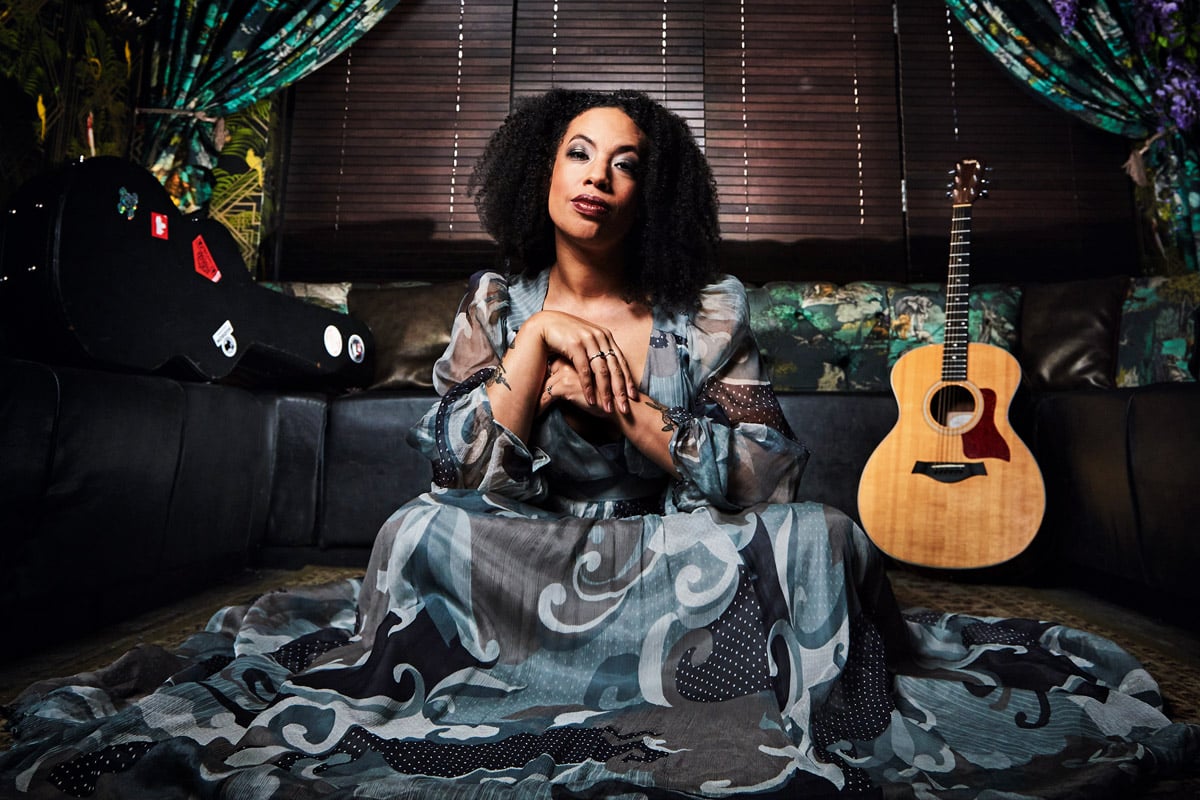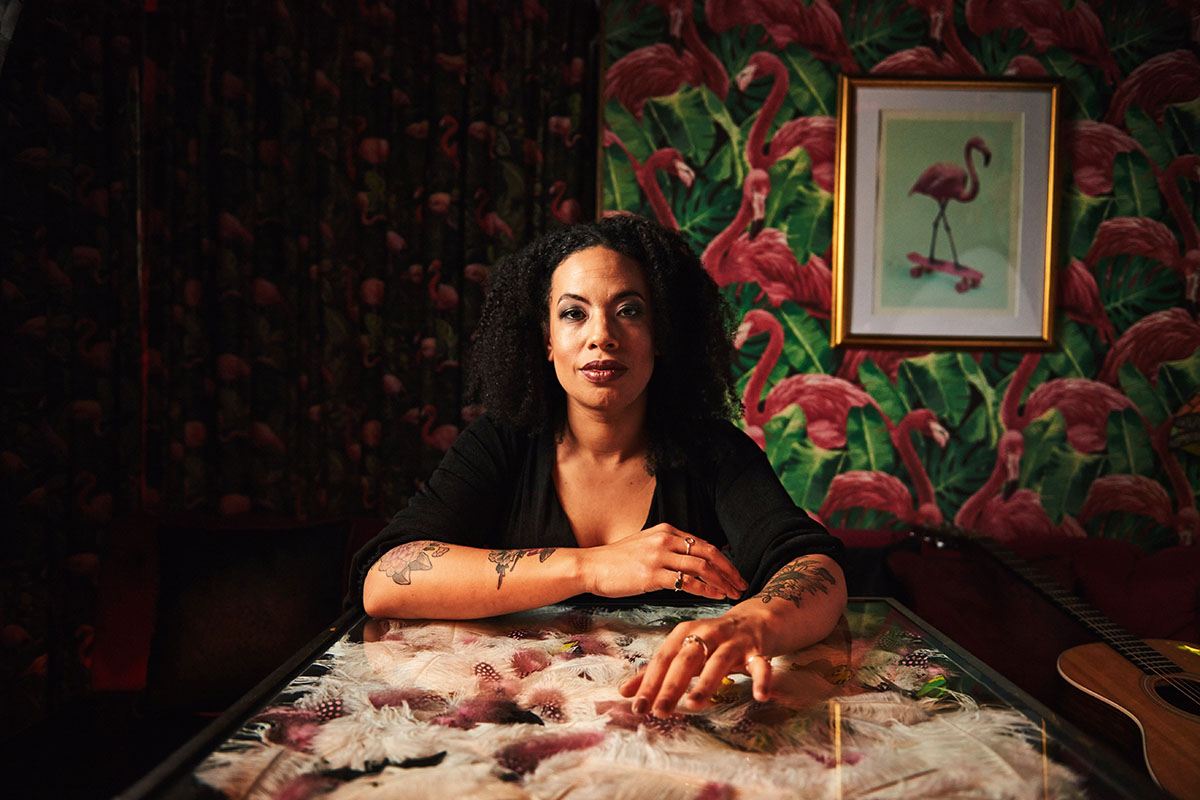Bristol’s Lady Nade recorded her 2016 crowd-funded debut Hard To Forget in her kitchen. “Because I love eating,” she jokes. “I can’t bear to be away from food for too long.” Since then she’s made a further two albums, 2019’s Safe Place and this year’s Willing, which was written, recorded and issued during the pandemic. All three capture her mellow voice over a beautifully woven tapestry of folk, blues, pop and Americana. There’s also a touch of soul and jazz to her songs that deal in the vagaries of love and heartache. She dubs her style ‘genre fluid’. “I take all kinds of music and mix them up,” she explains. “I don’t play them in their pure forms. I don’t sit down and think I’m going to write a blues song, I write wherever the creative process takes me. I know that can cause some people who like to put musicians in a box a problem, but I don’t like to be pigeon-holed and I also think it can be quite damaging having to fit into a box all the time, it’s creatively limiting.”
 Lady Nade doesn’t like to be pigeon-holed, and feels that people incorrectly give her a genre based on photos. Photo by Joseph Branston © Musicians' Union
Lady Nade doesn’t like to be pigeon-holed, and feels that people incorrectly give her a genre based on photos. Photo by Joseph Branston © Musicians' Union
She says she nicked the term ‘genre fluid’ from Yola Carter, another Bristol singer-songwriter. She identifies Yola as “a role model, a Black female artist who looks like me and was doing what I was doing when I was starting out and that was really important to see. I learned a lot from her,” she says.
For Nade, born Nadine Gingell in Bristol in 1988, her musical education began with her grandfather. “He had these wonderful eclectic mixtapes of rock’n’roll, folk and Americana and we’d listen to them together.” Then, when her grandmother died when Nade was just 10, music took on another function. “I wouldn’t have been able to talk about it in these terms then, but it was an outlet for my grief. Music became therapy and part of the healing process.” She started to write poems to her grandmother, “hoping that they would somehow bring her back to me. But that didn’t work so I decided to try my hand at song writing – and that didn’t work either, but my grandfather encouraged me to share my songs with my friends and they started making positive connections with them. They were a means for them to explore their own feelings through mine, and I started to sense the power of music and what it can do.”
Early career support
At 14 years old she joined the Bristol Plays Music programme at the Colston Hall ‑ now renamed Bristol Beacon – attending weekly song writing sessions. Her links to the venue remain strong. Earlier this year she performed at the launch of their ‘Make Space For Music’ campaign and also talked about how important the venue’s music education initiatives had been for her as a young person. “They gave me my first chance of performing and really championed me. They were so important in my formation,” she says. “They recognised my creative passion and provided a stable support system to express myself as a teen dealing with grief.” At the same time she took singing lessons, “Reluctantly. I wasn’t really interested at all in going along, but my friend was desperate to go. It turned out that she hated singing but I thought ‘this is great’, and I began singing at the top of my voice to anything and everything.”
At 16 she took the Bristol Plays Music’s peer mentoring qualification and began giving peer support to other songwriters and singers. “As a qualified music leader it was a way for me to help other creators like myself,” she says. She also began taking her music into the community, “into schools, colleges, hospitals, day care homes for people with dementia, into wards for children with life threatening illnesses. I have these two paths running side by side: as a music facilitator, using music for healing; and then as a performer, using my platforms to encourage and create other artists.”
Advocating for equality and diversity in music
For Nade, equality, diversity and empowerment within the arts is vital. Before lockdown, she hosted Lady Sings, a night in Bristol which over 16 months saw her work with 72 female artists. “It was about bringing together and empowering female artists,” she says. “I was putting on shows that focused on gender balance and giving a voice to people that might not have that platform normally. We’d have both new and established artists on a night together and there wasn’t a sense of support act or headliner – of one being more important than the other – it was about sharing a stage together and making a connection regardless of where you are at in your career. It was about building a community, where everyone is equal regardless of class or race.
Since I started out I’ve been expected to sing soul and jazz and R&B because of what I look like and who I am, and that has been a huge barrier to my career
Nade has experienced ‘the double-glazed ceiling’ she and other Black female artists face. “Since I started out I’ve been expected to sing soul and jazz and R&B because of what I look like and who I am, and that has been a huge barrier to my career,” she explains. “There’s this institutionalised racism and sexism: you’re Black, you’re female, why aren’t you singing jazz? I once got booked to play a jazz festival and afterwards the organiser said he was really disappointed in my set and I was like, ‘why did you book me?’ I’m not a jazz artist. He clearly had never heard my music and just made assumptions on my photo. I’m constantly having to explain why there is folk and Americana in my music. I don’t think if I was a white male folk singer I’d ever have to explain why. Joan Armatrading is a huge influence on me, she was on my grandfather’s tapes and I remember her being asked if Joni Mitchell was an influence on her and she saying, ‘if anything I’m an influence on her. I was doing this first’. Why do we never champion the Black female originators? Like Sister Rosetta Tharpe – she invented rock’n’roll.”
Celebrating Bristol
During lockdown we saw the emergence of the Black Lives Matter movement, and Nade was disappointed not to be able to take part in the march through Bristol that led to the dismantling of the statue of slave trader Edward Colston. “I had an injury sustained in a bicycle accident,” she explains, “but I wanted to celebrate Bristol as a community coming together to protest against racism, so I put out my song Willing as a single which is a message of acceptance and supporting one another – and when it came to making the video to it, we filmed the walk along the route the BLM protests took, and the video ends at the base of the statue.”
 Lady Nade has been a keen supporter of the Musicians’ Union since her teens. Photo by Joseph Branston © Musicians' Union
Lady Nade has been a keen supporter of the Musicians’ Union since her teens. Photo by Joseph Branston © Musicians' Union
Along with using her social platforms to speak out against body shame and raise awareness of issues surrounding mental health, during lockdown Nade also played several online festivals, and was selected as one of 12 artists representing England at the Global Music Match. “With live streaming comes accessibility,” she says. “People who may have anxiety or physical disabilities that prevent them going to a crowded venue can tune into a live stream in their house. We’ve seen with the #MeToo campaign there are issues of women’s safety at gigs, so streaming allows females to watch a concert without fear, and in terms of sustainability there are advantages too. You don’t need to travel, and for me as an artist it has extended my reach and taken my music worldwide.”
Her love for performing in front of a live audience hasn’t diminished, and during the pandemic she became a patron of the Music Venue Trust. “Among many things, the organisation raises awareness of grassroots venues, and they were fundamental in my growth as an artist – and still are. To see the music industry fall apart during the pandemic was heart-breaking, and the Music Venue Trust is helping with picking up the pieces and putting them back together.”
She’s also keen to promote the work of the MU, which she’s been a member of since she was 18. “They’ve always been there to look out for me, and protect me and my art. And they were amazing during the pandemic, really helping their members’ survival through their hardship fund.”
Self-image
During the pandemic Lady Nade used her social platforms to open direct dialogue about mental health issues and body shaming. “32 of my 33 years I have never worn a bikini,” she says. “I was terrified to do so because I had developed stretch marks in my younger years and I was convinced they were ugly and my body wasn’t perfect because of them.
I shared this story online, and by sharing my story, loads of people started sharing their stories of stretch marks, and it became clear very quickly how stretch marks are normal. It made me realise just how so many of our industries let us down by constantly promoting this image of a perfect body that doesn’t exist. This sharing of stories provided a springboard for a discussion around how society presents and views the physical body, and how we can challenge those notions they put forward. I decided to face my fear, and I went to my friend’s house and I put on a bikini for the first time, and we took a photo. This was at a time of prolonged separation when we were isolated and we were having to go to work on Zoom and seeing ourselves on Zoom and having to readjust to seeing ourselves this way. And although putting the photo out there opened me up to bullies and trolls, it also showed just how we can use our platforms in a positive way, to encourage others and promote confidence and self-esteem.”
Find out more about Lady Nade.